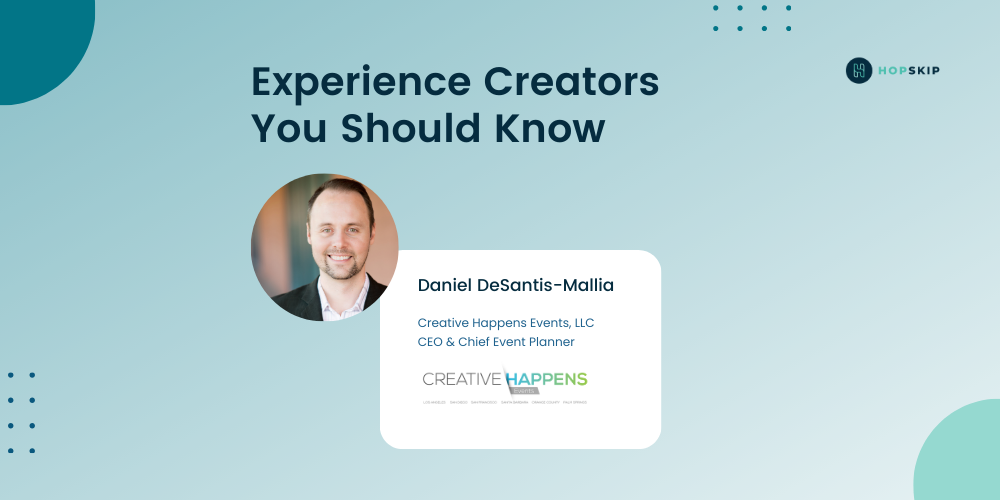Experience Creators You Should Know - Daniel DeSantis-Mallia, Creative Happens Events, LLC
Daniel DeSantis-Mallia, of Creative Happens Events, LLC, discusses how he honed his skills over the pandemic to now be in the position to overcome the challenges that the new meetings/events landscape brings.
Luke Whalin
Feb 19, 2024

This post is part of the HopSkip Planner Spotlight Series where HopSkip spotlights planners across the industry to bring awareness of how they adapted to COVID-19, communicating and lessons learned and sharing how they are viewing the meetings and events industry in a post-pandemic world.
Name: Daniel DeSantis-Mallia
Company Name: Creative Happens Events, LLC
Job Title: CEO & Chief Events Officer
Years of Experience: 15
How did you get your start in the events industry? What made you pursue this role?
I started off in the film industry, and as time passed started working with my team at the time to produce sponsored events to create video content. During that time, I realized I loved the live aspect of the event production and shifted my focus to creating one-of-a-kind celebrations.
How would you describe your role or responsibilities as a professional event planner?
Over the years we have found that life's most important celebrations are also the most creative ones. That is where our tagline comes from, "When Life Happens, Creative Happens!" These celebrations, big or small, are someone's special day, and our role is to make sure the planning and production process are as smooth, easy, and exciting as possible so they can enjoy their celebrations.
How do you compare planning your first in-person event post-pandemic, to planning meetings/events pre- Covid? What was different and unique? What was similar?
What challenges have you faced in your work as a meeting and event planner, when working with suppliers or sourcing a venue and how did you overcome them?
Pre-Covid events were a fair bit more lax in terms of "anything goes" as long as it is safe. Now that Covid has come and gone, I believe an air of caution has been added not only to the health and safety of event guests but also to the overall process of contracts, cancellations, postponement terms, and overall production preparedness that puts safeguards in place in case anything like Covid happens again.
I think the biggest challenge of planning successful events is finding and recruiting talented, responsive, and caring event vendors. We have overcome this challenge by tracking and keeping close relationships with talented vendors throughout the regions we service. While we do still face the challenge of new vendors we work with hired by our clients, we always track the ones that do a great job to help us with referrals and successful event staffing.
How do you determine which vendors are best suited for your stakeholder's needs while also finding those providing competitive services at affordable rates?
This really comes down to the event/wedding client's goals and budget. Vendors that are high in price are usually highly experienced with highly rated offerings. If the budget supports this, we'll always lean in this direction. Sometimes the budget is a bit lower, and we'll aim to work with new or preferred vendors to find highly rated vendors that could work well for our clients.
Are there any key lessons or insights that have shaped your approach to event planning over the years?
Nothing is more essential than communication. We respond to our clients quickly and thoroughly. This takes a lot of our time, but in doing so creates a sense of trustworthiness while creating a relationship with each client. They know we are listening, responding, and tracking all of their goals for a spectacular celebration.
Any event planner should carefully review what each hotel has to offer via calls and site visits for events. If a hotel is not offering a specific service, the planner can work with the venue and the couple to refer and recommend talented staff such as caterers, bartenders and staffing teams, and much more. If a hotel is short staff, we'd treat it more like an empty shell venue, finding the best possible team members to produce a successful event.
Are you approaching contracting with hotels differently, post-pandemic?
I think hotels have changed the way they offer event spaces and room blocks. Postponements and cancellation terms of overall space use have changed a fair bit, but all in ways that are clearly defined and protective of both the hotel and the client should anything like COVID happen again.
What is the biggest area of improvement that you think hotels can make when either responding to your RFPs or during the contract phase of your event?
Due to the pandemic, our events community had to evolve, adapt, and grow. Many planners started to embrace new technologies as a result of the pandemic. What new tech are you using today in your planning process as a result?
Since education and relationships are two major pillars in the meetings and events industry, any suggestions on how other planners can learn and network with their peers across the industry?
Responsiveness and information sharing. Sometimes, a hotel might take 3 to 7 days, if not longer, to reply to an RFP. A lot also use online systems where they may not get the email at all. Thoughtful and timely responses are key for garnering attention and speedy client booking.
We've started using Honeybook to help with faster contracts, questionnaires, and information sharing. The world of digital meetings, agreements, and documents became common practice during the pandemic, and this digital tool has helped us streamline our online practices.
Networking is essential for any event planner. It is meeting with other planners, studying trends and technologies, and even scoping out event magazines that help us create the newest and most fun experiences for our clients.